Analyzing Political undertones in Star Wars: Cultural Anthropology
VerifiedAdded on 2023/06/12
|7
|1811
|180
Essay
AI Summary
This essay examines the political messages present in the Star Wars franchise through the lens of cultural anthropology. It begins by addressing the initial denials of political content by Disney's CEO, followed by a discussion of how science fiction often incorporates commentary on contemporary issues. The essay reviews literature on the relationship between politics and film, highlighting the use of film as propaganda throughout history. It then focuses on the political themes within Star Wars, particularly how the series reflects concerns about the erosion of democracies, inspired by the Vietnam War era. The essay contrasts liberal and conservative viewpoints, suggesting that while George Lucas benefited from a capitalist system, his personal beliefs leaned towards democratic ideals over capitalist democracy, emphasizing his concern about wealth influencing government. The analysis concludes by affirming the presence of political and cultural undertones within the Star Wars saga, inviting further exploration and discussion.
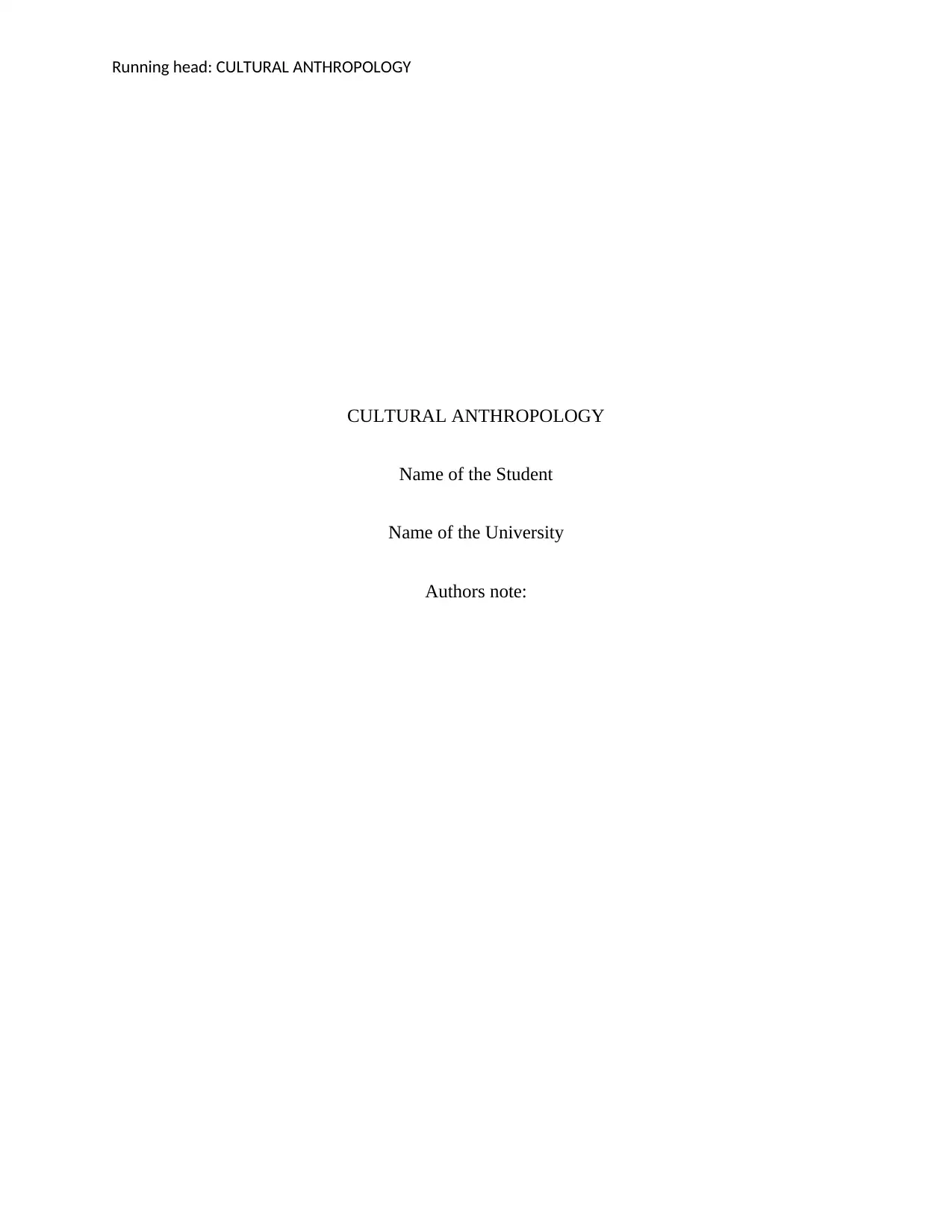
Running head: CULTURAL ANTHROPOLOGY
CULTURAL ANTHROPOLOGY
Name of the Student
Name of the University
Authors note:
CULTURAL ANTHROPOLOGY
Name of the Student
Name of the University
Authors note:
Paraphrase This Document
Need a fresh take? Get an instant paraphrase of this document with our AI Paraphraser
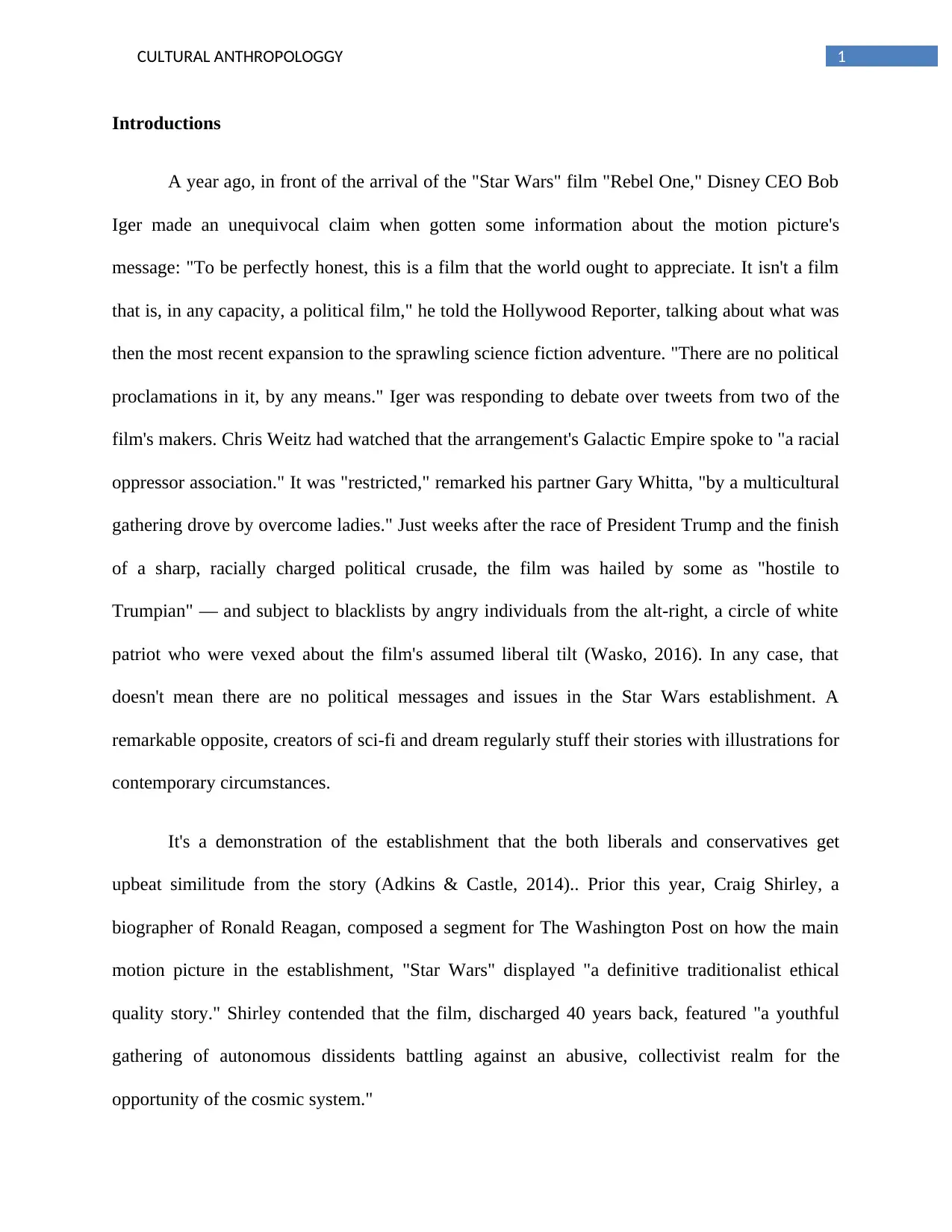
1CULTURAL ANTHROPOLOGGY
Introductions
A year ago, in front of the arrival of the "Star Wars" film "Rebel One," Disney CEO Bob
Iger made an unequivocal claim when gotten some information about the motion picture's
message: "To be perfectly honest, this is a film that the world ought to appreciate. It isn't a film
that is, in any capacity, a political film," he told the Hollywood Reporter, talking about what was
then the most recent expansion to the sprawling science fiction adventure. "There are no political
proclamations in it, by any means." Iger was responding to debate over tweets from two of the
film's makers. Chris Weitz had watched that the arrangement's Galactic Empire spoke to "a racial
oppressor association." It was "restricted," remarked his partner Gary Whitta, "by a multicultural
gathering drove by overcome ladies." Just weeks after the race of President Trump and the finish
of a sharp, racially charged political crusade, the film was hailed by some as "hostile to
Trumpian" — and subject to blacklists by angry individuals from the alt-right, a circle of white
patriot who were vexed about the film's assumed liberal tilt (Wasko, 2016). In any case, that
doesn't mean there are no political messages and issues in the Star Wars establishment. A
remarkable opposite, creators of sci-fi and dream regularly stuff their stories with illustrations for
contemporary circumstances.
It's a demonstration of the establishment that the both liberals and conservatives get
upbeat similitude from the story (Adkins & Castle, 2014).. Prior this year, Craig Shirley, a
biographer of Ronald Reagan, composed a segment for The Washington Post on how the main
motion picture in the establishment, "Star Wars" displayed "a definitive traditionalist ethical
quality story." Shirley contended that the film, discharged 40 years back, featured "a youthful
gathering of autonomous dissidents battling against an abusive, collectivist realm for the
opportunity of the cosmic system."
Introductions
A year ago, in front of the arrival of the "Star Wars" film "Rebel One," Disney CEO Bob
Iger made an unequivocal claim when gotten some information about the motion picture's
message: "To be perfectly honest, this is a film that the world ought to appreciate. It isn't a film
that is, in any capacity, a political film," he told the Hollywood Reporter, talking about what was
then the most recent expansion to the sprawling science fiction adventure. "There are no political
proclamations in it, by any means." Iger was responding to debate over tweets from two of the
film's makers. Chris Weitz had watched that the arrangement's Galactic Empire spoke to "a racial
oppressor association." It was "restricted," remarked his partner Gary Whitta, "by a multicultural
gathering drove by overcome ladies." Just weeks after the race of President Trump and the finish
of a sharp, racially charged political crusade, the film was hailed by some as "hostile to
Trumpian" — and subject to blacklists by angry individuals from the alt-right, a circle of white
patriot who were vexed about the film's assumed liberal tilt (Wasko, 2016). In any case, that
doesn't mean there are no political messages and issues in the Star Wars establishment. A
remarkable opposite, creators of sci-fi and dream regularly stuff their stories with illustrations for
contemporary circumstances.
It's a demonstration of the establishment that the both liberals and conservatives get
upbeat similitude from the story (Adkins & Castle, 2014).. Prior this year, Craig Shirley, a
biographer of Ronald Reagan, composed a segment for The Washington Post on how the main
motion picture in the establishment, "Star Wars" displayed "a definitive traditionalist ethical
quality story." Shirley contended that the film, discharged 40 years back, featured "a youthful
gathering of autonomous dissidents battling against an abusive, collectivist realm for the
opportunity of the cosmic system."
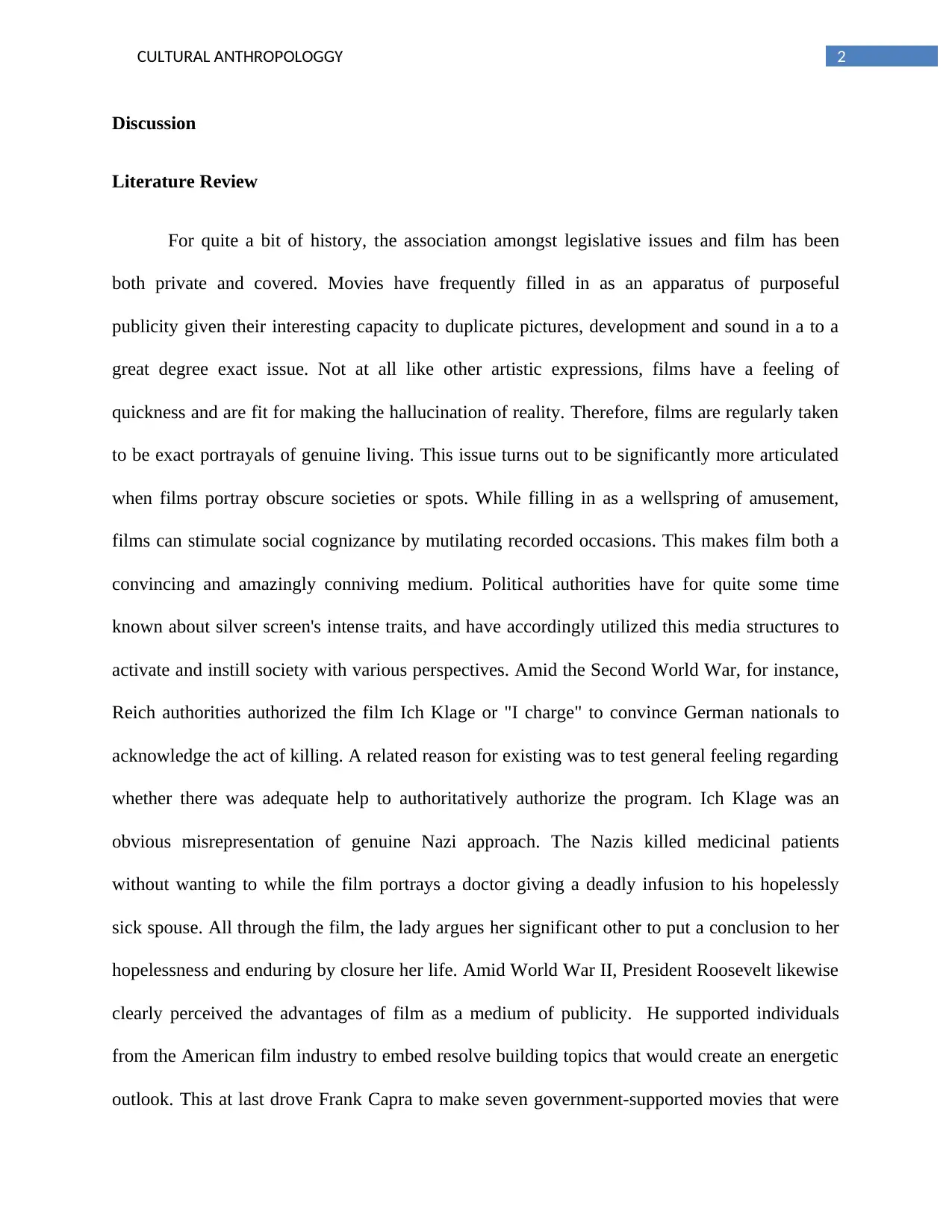
2CULTURAL ANTHROPOLOGGY
Discussion
Literature Review
For quite a bit of history, the association amongst legislative issues and film has been
both private and covered. Movies have frequently filled in as an apparatus of purposeful
publicity given their interesting capacity to duplicate pictures, development and sound in a to a
great degree exact issue. Not at all like other artistic expressions, films have a feeling of
quickness and are fit for making the hallucination of reality. Therefore, films are regularly taken
to be exact portrayals of genuine living. This issue turns out to be significantly more articulated
when films portray obscure societies or spots. While filling in as a wellspring of amusement,
films can stimulate social cognizance by mutilating recorded occasions. This makes film both a
convincing and amazingly conniving medium. Political authorities have for quite some time
known about silver screen's intense traits, and have accordingly utilized this media structures to
activate and instill society with various perspectives. Amid the Second World War, for instance,
Reich authorities authorized the film Ich Klage or "I charge" to convince German nationals to
acknowledge the act of killing. A related reason for existing was to test general feeling regarding
whether there was adequate help to authoritatively authorize the program. Ich Klage was an
obvious misrepresentation of genuine Nazi approach. The Nazis killed medicinal patients
without wanting to while the film portrays a doctor giving a deadly infusion to his hopelessly
sick spouse. All through the film, the lady argues her significant other to put a conclusion to her
hopelessness and enduring by closure her life. Amid World War II, President Roosevelt likewise
clearly perceived the advantages of film as a medium of publicity. He supported individuals
from the American film industry to embed resolve building topics that would create an energetic
outlook. This at last drove Frank Capra to make seven government-supported movies that were
Discussion
Literature Review
For quite a bit of history, the association amongst legislative issues and film has been
both private and covered. Movies have frequently filled in as an apparatus of purposeful
publicity given their interesting capacity to duplicate pictures, development and sound in a to a
great degree exact issue. Not at all like other artistic expressions, films have a feeling of
quickness and are fit for making the hallucination of reality. Therefore, films are regularly taken
to be exact portrayals of genuine living. This issue turns out to be significantly more articulated
when films portray obscure societies or spots. While filling in as a wellspring of amusement,
films can stimulate social cognizance by mutilating recorded occasions. This makes film both a
convincing and amazingly conniving medium. Political authorities have for quite some time
known about silver screen's intense traits, and have accordingly utilized this media structures to
activate and instill society with various perspectives. Amid the Second World War, for instance,
Reich authorities authorized the film Ich Klage or "I charge" to convince German nationals to
acknowledge the act of killing. A related reason for existing was to test general feeling regarding
whether there was adequate help to authoritatively authorize the program. Ich Klage was an
obvious misrepresentation of genuine Nazi approach. The Nazis killed medicinal patients
without wanting to while the film portrays a doctor giving a deadly infusion to his hopelessly
sick spouse. All through the film, the lady argues her significant other to put a conclusion to her
hopelessness and enduring by closure her life. Amid World War II, President Roosevelt likewise
clearly perceived the advantages of film as a medium of publicity. He supported individuals
from the American film industry to embed resolve building topics that would create an energetic
outlook. This at last drove Frank Capra to make seven government-supported movies that were
⊘ This is a preview!⊘
Do you want full access?
Subscribe today to unlock all pages.

Trusted by 1+ million students worldwide
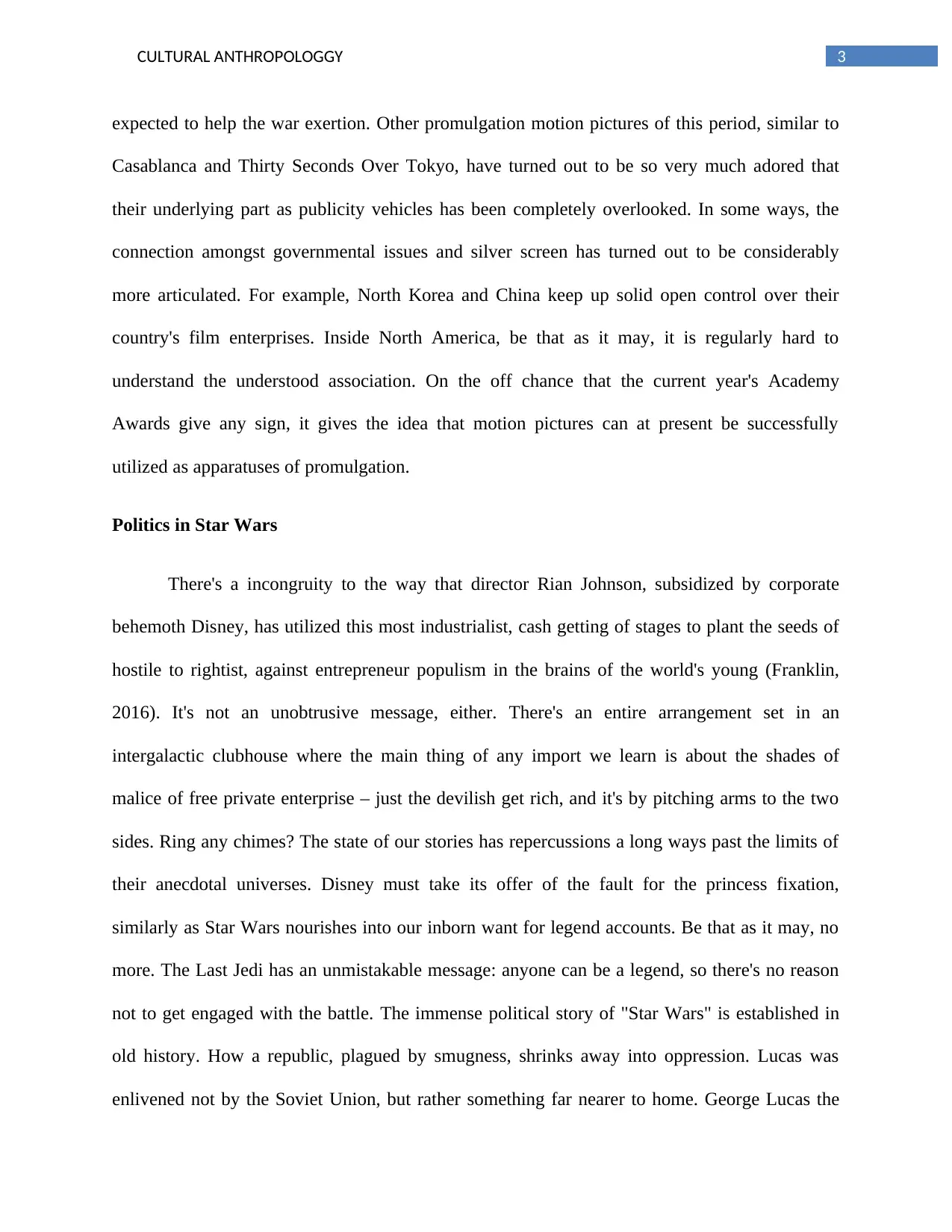
3CULTURAL ANTHROPOLOGGY
expected to help the war exertion. Other promulgation motion pictures of this period, similar to
Casablanca and Thirty Seconds Over Tokyo, have turned out to be so very much adored that
their underlying part as publicity vehicles has been completely overlooked. In some ways, the
connection amongst governmental issues and silver screen has turned out to be considerably
more articulated. For example, North Korea and China keep up solid open control over their
country's film enterprises. Inside North America, be that as it may, it is regularly hard to
understand the understood association. On the off chance that the current year's Academy
Awards give any sign, it gives the idea that motion pictures can at present be successfully
utilized as apparatuses of promulgation.
Politics in Star Wars
There's a incongruity to the way that director Rian Johnson, subsidized by corporate
behemoth Disney, has utilized this most industrialist, cash getting of stages to plant the seeds of
hostile to rightist, against entrepreneur populism in the brains of the world's young (Franklin,
2016). It's not an unobtrusive message, either. There's an entire arrangement set in an
intergalactic clubhouse where the main thing of any import we learn is about the shades of
malice of free private enterprise – just the devilish get rich, and it's by pitching arms to the two
sides. Ring any chimes? The state of our stories has repercussions a long ways past the limits of
their anecdotal universes. Disney must take its offer of the fault for the princess fixation,
similarly as Star Wars nourishes into our inborn want for legend accounts. Be that as it may, no
more. The Last Jedi has an unmistakable message: anyone can be a legend, so there's no reason
not to get engaged with the battle. The immense political story of "Star Wars" is established in
old history. How a republic, plagued by smugness, shrinks away into oppression. Lucas was
enlivened not by the Soviet Union, but rather something far nearer to home. George Lucas the
expected to help the war exertion. Other promulgation motion pictures of this period, similar to
Casablanca and Thirty Seconds Over Tokyo, have turned out to be so very much adored that
their underlying part as publicity vehicles has been completely overlooked. In some ways, the
connection amongst governmental issues and silver screen has turned out to be considerably
more articulated. For example, North Korea and China keep up solid open control over their
country's film enterprises. Inside North America, be that as it may, it is regularly hard to
understand the understood association. On the off chance that the current year's Academy
Awards give any sign, it gives the idea that motion pictures can at present be successfully
utilized as apparatuses of promulgation.
Politics in Star Wars
There's a incongruity to the way that director Rian Johnson, subsidized by corporate
behemoth Disney, has utilized this most industrialist, cash getting of stages to plant the seeds of
hostile to rightist, against entrepreneur populism in the brains of the world's young (Franklin,
2016). It's not an unobtrusive message, either. There's an entire arrangement set in an
intergalactic clubhouse where the main thing of any import we learn is about the shades of
malice of free private enterprise – just the devilish get rich, and it's by pitching arms to the two
sides. Ring any chimes? The state of our stories has repercussions a long ways past the limits of
their anecdotal universes. Disney must take its offer of the fault for the princess fixation,
similarly as Star Wars nourishes into our inborn want for legend accounts. Be that as it may, no
more. The Last Jedi has an unmistakable message: anyone can be a legend, so there's no reason
not to get engaged with the battle. The immense political story of "Star Wars" is established in
old history. How a republic, plagued by smugness, shrinks away into oppression. Lucas was
enlivened not by the Soviet Union, but rather something far nearer to home. George Lucas the
Paraphrase This Document
Need a fresh take? Get an instant paraphrase of this document with our AI Paraphraser
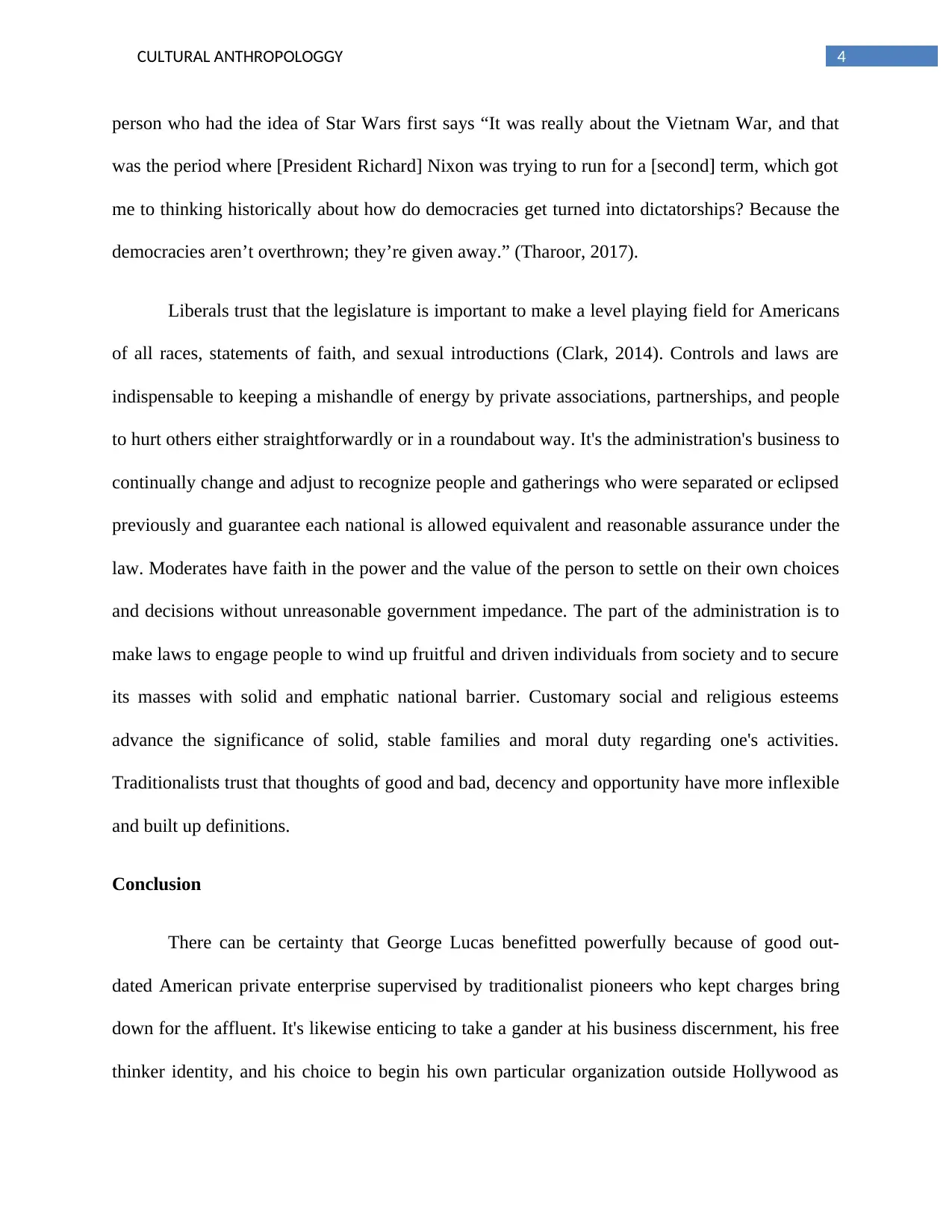
4CULTURAL ANTHROPOLOGGY
person who had the idea of Star Wars first says “It was really about the Vietnam War, and that
was the period where [President Richard] Nixon was trying to run for a [second] term, which got
me to thinking historically about how do democracies get turned into dictatorships? Because the
democracies aren’t overthrown; they’re given away.” (Tharoor, 2017).
Liberals trust that the legislature is important to make a level playing field for Americans
of all races, statements of faith, and sexual introductions (Clark, 2014). Controls and laws are
indispensable to keeping a mishandle of energy by private associations, partnerships, and people
to hurt others either straightforwardly or in a roundabout way. It's the administration's business to
continually change and adjust to recognize people and gatherings who were separated or eclipsed
previously and guarantee each national is allowed equivalent and reasonable assurance under the
law. Moderates have faith in the power and the value of the person to settle on their own choices
and decisions without unreasonable government impedance. The part of the administration is to
make laws to engage people to wind up fruitful and driven individuals from society and to secure
its masses with solid and emphatic national barrier. Customary social and religious esteems
advance the significance of solid, stable families and moral duty regarding one's activities.
Traditionalists trust that thoughts of good and bad, decency and opportunity have more inflexible
and built up definitions.
Conclusion
There can be certainty that George Lucas benefitted powerfully because of good out-
dated American private enterprise supervised by traditionalist pioneers who kept charges bring
down for the affluent. It's likewise enticing to take a gander at his business discernment, his free
thinker identity, and his choice to begin his own particular organization outside Hollywood as
person who had the idea of Star Wars first says “It was really about the Vietnam War, and that
was the period where [President Richard] Nixon was trying to run for a [second] term, which got
me to thinking historically about how do democracies get turned into dictatorships? Because the
democracies aren’t overthrown; they’re given away.” (Tharoor, 2017).
Liberals trust that the legislature is important to make a level playing field for Americans
of all races, statements of faith, and sexual introductions (Clark, 2014). Controls and laws are
indispensable to keeping a mishandle of energy by private associations, partnerships, and people
to hurt others either straightforwardly or in a roundabout way. It's the administration's business to
continually change and adjust to recognize people and gatherings who were separated or eclipsed
previously and guarantee each national is allowed equivalent and reasonable assurance under the
law. Moderates have faith in the power and the value of the person to settle on their own choices
and decisions without unreasonable government impedance. The part of the administration is to
make laws to engage people to wind up fruitful and driven individuals from society and to secure
its masses with solid and emphatic national barrier. Customary social and religious esteems
advance the significance of solid, stable families and moral duty regarding one's activities.
Traditionalists trust that thoughts of good and bad, decency and opportunity have more inflexible
and built up definitions.
Conclusion
There can be certainty that George Lucas benefitted powerfully because of good out-
dated American private enterprise supervised by traditionalist pioneers who kept charges bring
down for the affluent. It's likewise enticing to take a gander at his business discernment, his free
thinker identity, and his choice to begin his own particular organization outside Hollywood as
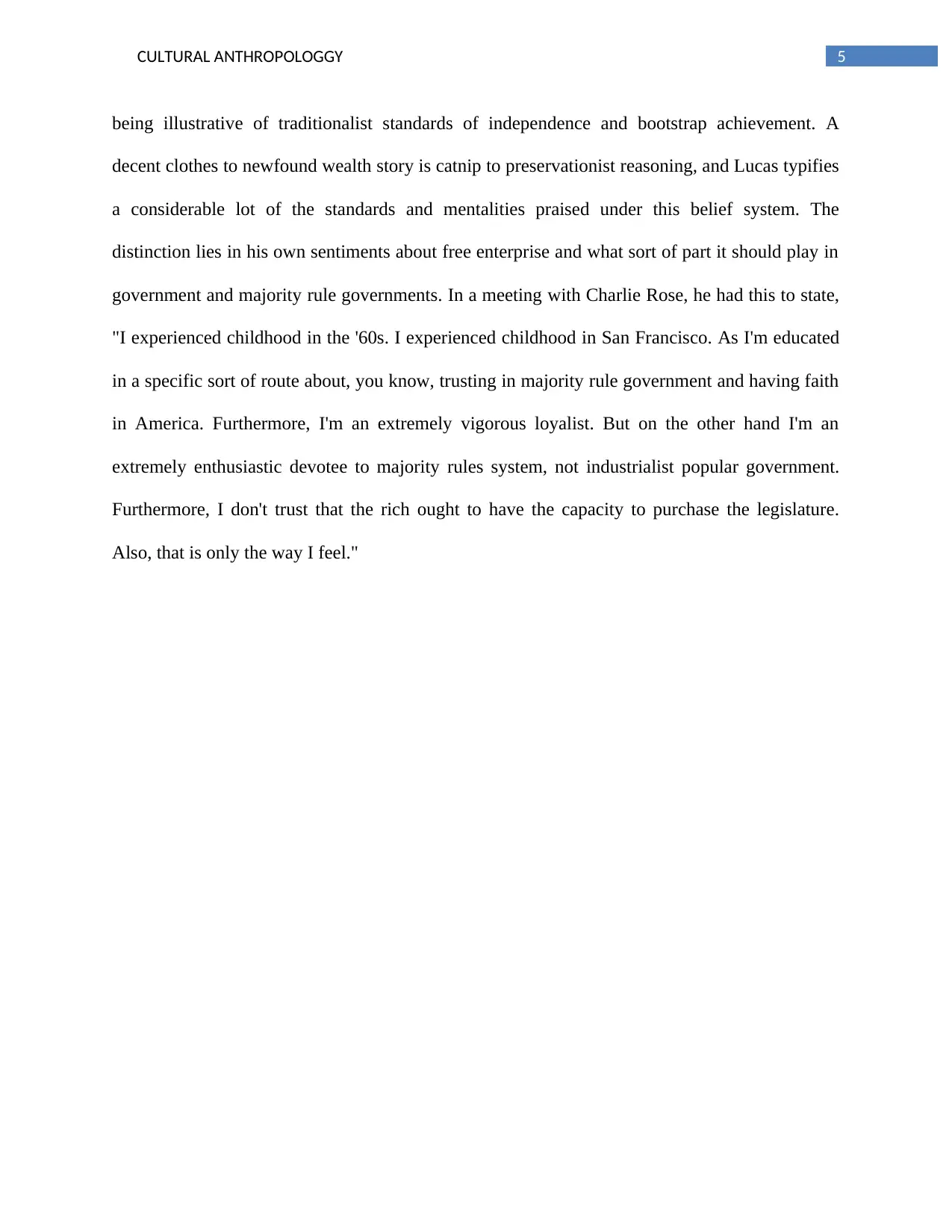
5CULTURAL ANTHROPOLOGGY
being illustrative of traditionalist standards of independence and bootstrap achievement. A
decent clothes to newfound wealth story is catnip to preservationist reasoning, and Lucas typifies
a considerable lot of the standards and mentalities praised under this belief system. The
distinction lies in his own sentiments about free enterprise and what sort of part it should play in
government and majority rule governments. In a meeting with Charlie Rose, he had this to state,
"I experienced childhood in the '60s. I experienced childhood in San Francisco. As I'm educated
in a specific sort of route about, you know, trusting in majority rule government and having faith
in America. Furthermore, I'm an extremely vigorous loyalist. But on the other hand I'm an
extremely enthusiastic devotee to majority rules system, not industrialist popular government.
Furthermore, I don't trust that the rich ought to have the capacity to purchase the legislature.
Also, that is only the way I feel."
being illustrative of traditionalist standards of independence and bootstrap achievement. A
decent clothes to newfound wealth story is catnip to preservationist reasoning, and Lucas typifies
a considerable lot of the standards and mentalities praised under this belief system. The
distinction lies in his own sentiments about free enterprise and what sort of part it should play in
government and majority rule governments. In a meeting with Charlie Rose, he had this to state,
"I experienced childhood in the '60s. I experienced childhood in San Francisco. As I'm educated
in a specific sort of route about, you know, trusting in majority rule government and having faith
in America. Furthermore, I'm an extremely vigorous loyalist. But on the other hand I'm an
extremely enthusiastic devotee to majority rules system, not industrialist popular government.
Furthermore, I don't trust that the rich ought to have the capacity to purchase the legislature.
Also, that is only the way I feel."
⊘ This is a preview!⊘
Do you want full access?
Subscribe today to unlock all pages.

Trusted by 1+ million students worldwide
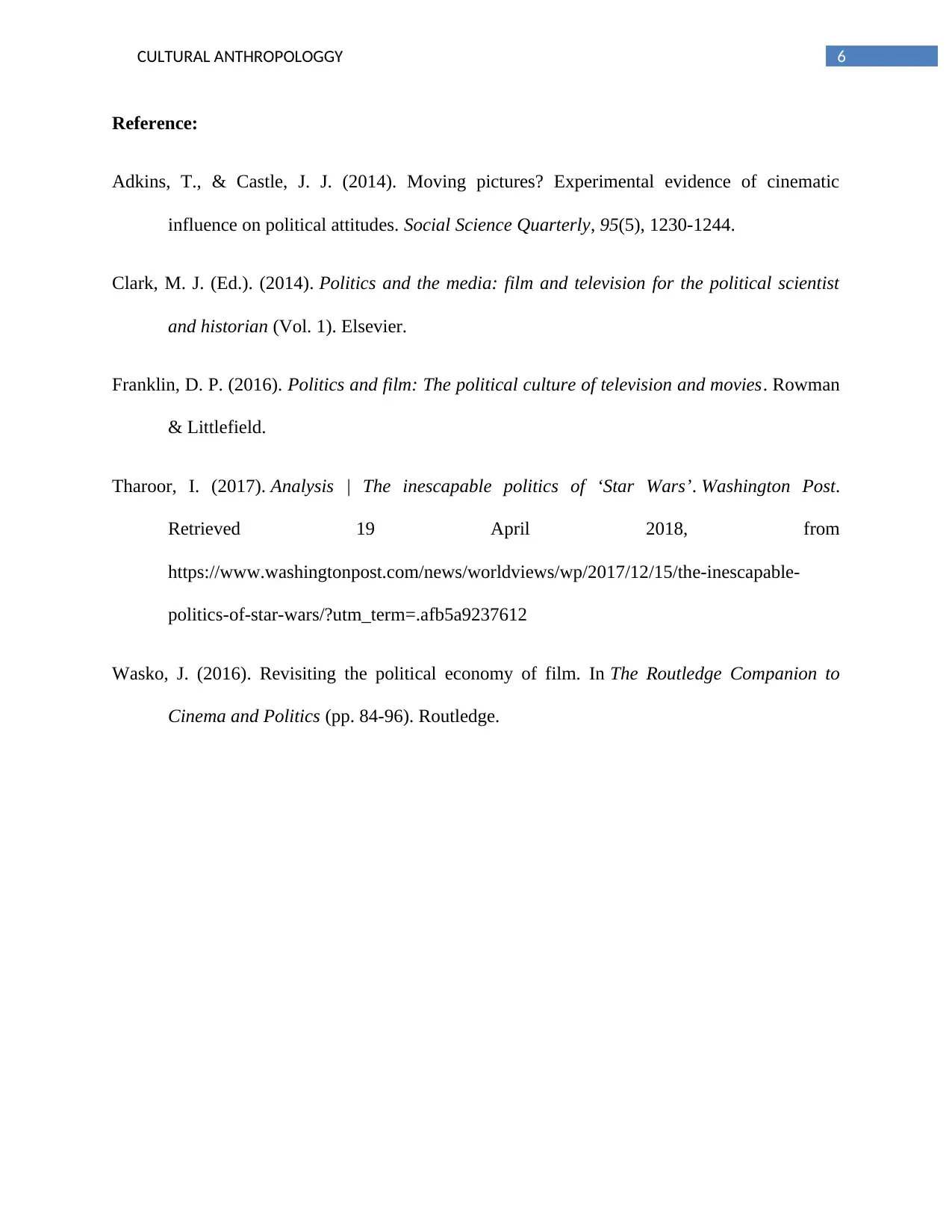
6CULTURAL ANTHROPOLOGGY
Reference:
Adkins, T., & Castle, J. J. (2014). Moving pictures? Experimental evidence of cinematic
influence on political attitudes. Social Science Quarterly, 95(5), 1230-1244.
Clark, M. J. (Ed.). (2014). Politics and the media: film and television for the political scientist
and historian (Vol. 1). Elsevier.
Franklin, D. P. (2016). Politics and film: The political culture of television and movies. Rowman
& Littlefield.
Tharoor, I. (2017). Analysis | The inescapable politics of ‘Star Wars’. Washington Post.
Retrieved 19 April 2018, from
https://www.washingtonpost.com/news/worldviews/wp/2017/12/15/the-inescapable-
politics-of-star-wars/?utm_term=.afb5a9237612
Wasko, J. (2016). Revisiting the political economy of film. In The Routledge Companion to
Cinema and Politics (pp. 84-96). Routledge.
Reference:
Adkins, T., & Castle, J. J. (2014). Moving pictures? Experimental evidence of cinematic
influence on political attitudes. Social Science Quarterly, 95(5), 1230-1244.
Clark, M. J. (Ed.). (2014). Politics and the media: film and television for the political scientist
and historian (Vol. 1). Elsevier.
Franklin, D. P. (2016). Politics and film: The political culture of television and movies. Rowman
& Littlefield.
Tharoor, I. (2017). Analysis | The inescapable politics of ‘Star Wars’. Washington Post.
Retrieved 19 April 2018, from
https://www.washingtonpost.com/news/worldviews/wp/2017/12/15/the-inescapable-
politics-of-star-wars/?utm_term=.afb5a9237612
Wasko, J. (2016). Revisiting the political economy of film. In The Routledge Companion to
Cinema and Politics (pp. 84-96). Routledge.
1 out of 7
Your All-in-One AI-Powered Toolkit for Academic Success.
+13062052269
info@desklib.com
Available 24*7 on WhatsApp / Email
![[object Object]](/_next/static/media/star-bottom.7253800d.svg)
Unlock your academic potential
Copyright © 2020–2026 A2Z Services. All Rights Reserved. Developed and managed by ZUCOL.